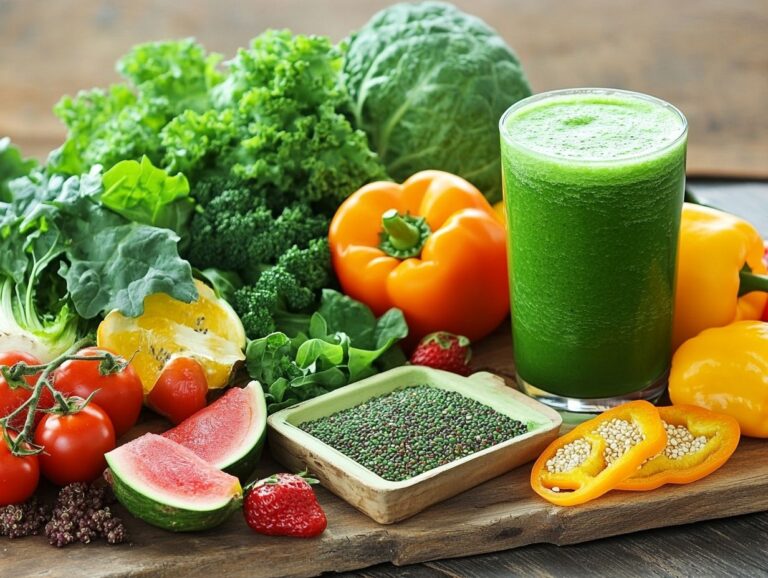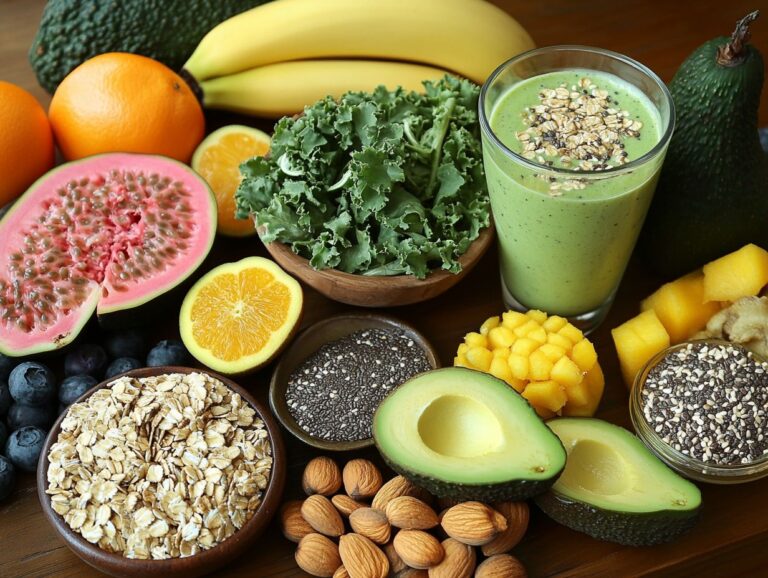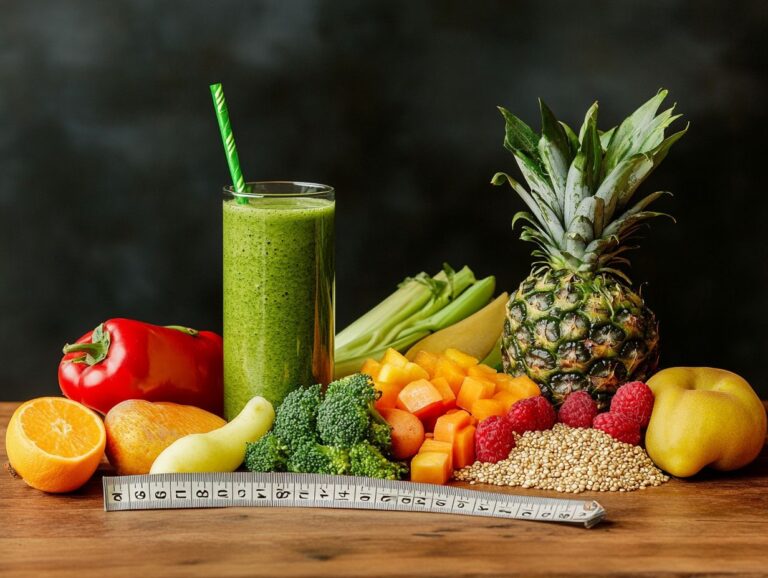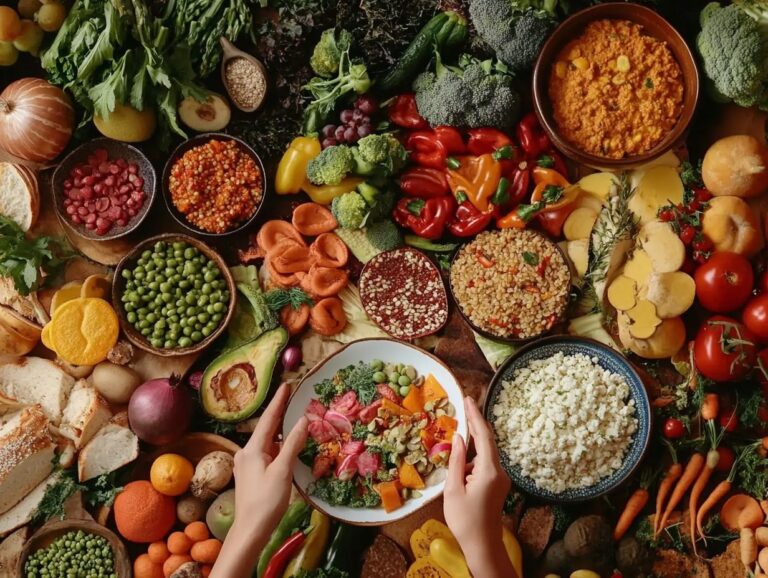Lenny Kravitz is a rockstar and a strong advocate for a vegan lifestyle. This article explores his journey into veganism, the motivations behind his dietary choices, and the challenges he encountered along the way. It also highlights the benefits of a vegan diet, including its positive impact on overall health and wellness, as well as its environmental advantages. The article showcases Kravitz’s favorite meals and recipes, along with advice for those looking to make a similar transition. As discussed in the article, a plant-based diet plays a crucial role in the legendary musician’s approach to vibrant health.
Who Is Lenny Kravitz?
![]()
Lenny Kravitz is an iconic musician and actor celebrated for his distinctive blend of rock, blues, and funk influences that have captivated audiences around the globe.
Born on May 26, 1964, in New York City, he rose to prominence in the late 1980s, quickly becoming a renowned music star with numerous chart-topping hits and multiple Grammy Awards.
Plus his musical talents, Kravitz is recognized as a prominent vegan and an advocate for sustainable living, demonstrating how personal choices can positively affect animal rights and the environment.
His influence extends beyond music, inspiring fellow vegan musicians and fans to adopt a plant-based lifestyle.
What Is a Vegan Diet?
A vegan diet is a plant-based diet that excludes all animal products, including meat, dairy, and eggs. Vegans consume a diverse array of plant foods, such as fruits, vegetables, grains, nuts, and seeds.
While adopting a vegan diet is a personal choice for many, it is also part of broader movements advocating for animal rights and sustainable living. Numerous individuals choose a vegan diet to enjoy its health benefits, address environmental concerns, or for ethical reasons related to vegan activism, which aims to end animal suffering and promote a compassionate lifestyle.
What Are the Benefits of a Vegan Diet?
Vegan diets offer numerous advantages that positively impact personal health, weight management, and the environment. Research indicates that individuals following a vegan diet experience lower disease rates, improved heart health, and enhanced weight management due to their higher consumption of nutrient-dense plant foods.
Additionally, a plant-based diet reduces an individual’s carbon footprint and promotes sustainable living practices, making it a popular choice among environmentally conscious individuals.
Beyond these health benefits, many people report experiencing increased overall well-being, greater energy levels, and even an uplifted mood as a result of consuming higher amounts of vitamins and antioxidants.
Furthermore, a vegan diet addresses issues associated with animal agriculture, such as habitat destruction and water depletion, while also fostering a more balanced ecosystem.
Those who adopt a plant-based lifestyle often discover new flavors and cooking techniques, transforming food into an enjoyable and creative aspect of their lives.
The combination of health and environmental benefits not only enables individuals to make more informed choices but also drives a global movement toward a more sustainable future.
How Did Lenny Kravitz Transition to a Vegan Diet?
Lenny Kravitz’s decision to adopt a vegan diet represents a significant personal commitment to health and animal rights. Over the years, he has become a prominent advocate for veganism, sharing his journey with fans and fellow musicians alike.
Kravitz illustrates that transitioning to a plant-based lifestyle can be both fulfilling and beneficial. However, his journey has not been without challenges, as adapting to a vegan diet often necessitates adjustments in meal planning and lifestyle changes that resonate with many aspiring vegan musicians and advocates.
What Inspired Lenny Kravitz to Go Vegan?
![]()
Lenny Kravitz’s decision to adopt a vegan lifestyle is rooted in his strong values related to animal rights and a desire for healthier living. He was influenced by various forms of vegan activism throughout his life and realized that a vegan diet was a meaningful expression of his beliefs about compassion, sustainability, and animal welfare.
This decision naturally extended from his concern for animal welfare, and he viewed it as an opportunity to inspire others to consider the implications of their dietary choices. During his journey, he connected with inspiring activists and watched documentaries that revealed the harsh treatment of animals in the food industry, prompting him to reevaluate his own habits.
The powerful stories and experiences shared by those passionate about the benefits of veganism motivated him to make significant changes in his life. Plus his artistic pursuits, Kravitz began to appreciate the holistic aspects of plant-based eating, which aligned with his values concerning health and wellness.
He actively sought ways to promote the benefits of veganism, leveraging his fame to raise awareness about ethical consumption and to encourage greater respect for the planet.
What Were the Challenges of Transitioning to a Vegan Diet?
Transitioning to a vegan diet can be challenging, and Lenny Kravitz encountered many of the same obstacles that aspiring vegan musicians face. From limited social situations with few food options to the need to meet his nutritional requirements through plant foods, Kravitz faced hurdles that many aspiring vegan musicians may also experience.
However, despite these challenges, his commitment to veganism and his personal choices enabled him to adapt to his new lifestyle and thrive.
One of the most significant difficulties was the perceived lack of variety and flavor in plant-based meals, which often discourages people from fully adopting the lifestyle. Kravitz discovered how to use a diverse range of ingredients, spices, and cooking methods to create delicious meals that energized him for performances.
His journey highlights the importance of creativity in the kitchen and serves as a reminder to other artists and fans to explore their resources and community networks. This exploration can make the transition to veganism easier while allowing them to enjoy the wide array of flavors that a plant-based diet can offer.
What Does Lenny Kravitz Eat on a Vegan Diet?
Lenny Kravitz’s vegan diet features a diverse array of meals that are both nutrient-rich and flavorful, supporting his active lifestyle.
He typically enjoys meals that include a wide variety of plant-based foods such as fruits, vegetables, whole grains, nuts, and legumes, which provide the energy and nutrients he needs while touring and performing.
By sharing his favorite foods and typical meals, he demonstrates that a vegan diet can be both hearty and enjoyable.
What Are Some Typical Meals in Lenny Kravitz’s Vegan Diet?
Lenny Kravitz’s vegan diet features a vibrant selection of plant-based foods that not only delight his taste buds but also provide essential nutrients.
For breakfast, he might enjoy a smoothie made with spinach, banana, and almond milk. At lunchtime, he could have a hearty quinoa salad filled with mixed vegetables and drizzled with tahini dressing.
Dinner often includes a delicious stir-fry with tofu and a variety of colorful vegetables, showcasing the diversity and enjoyment of vegan meals. Each meal is crafted not only for flavor but also to emphasize the abundance of vitamins and minerals found in whole foods.
For example, the leafy greens in his smoothie are rich in iron and calcium, while the bananas add natural sweetness and potassium. The quinoa salad serves as a powerhouse of protein and fiber, ensuring sustained energy throughout the day.
His stir-fry, infused with ginger and garlic, tantalizes the palate and highlights the versatility of plant-based dishes, illustrating how easy it is to create nourishing and satisfying meals.
By incorporating ingredients such as tempeh, seasonal vegetables, and various herbs and spices, one can discover the imaginative possibilities within vegan cooking.
What Are Some of Lenny Kravitz’s Favorite Vegan Recipes?
![]()
Lenny Kravitz has several vegan recipes that he loves, reflecting his passion for healthy and delicious plant-based foods. One of his favorites is a colorful vegetable curry that combines a mix of spices, chickpeas, and seasonal vegetables, resulting in a nutritionally balanced meal. He also prepares a zesty black bean burger, showcasing how vegan recipes can be both healthy and indulgent. This is significant to him because he states that eating is one of his two greatest pleasures in life, the other being sex.
The vegetable curry incorporates turmeric and coconut milk, both known for their anti-inflammatory properties. When combined with chickpeas, this dish becomes rich in fiber and plant-based protein.
For the black bean burgers, adding avocado or using a whole grain bun can enhance the nutritional value by introducing healthy fats and complex carbohydrates, which promote a feeling of fullness and sustained energy.
Lenny Kravitz’s culinary choices and the reasoning behind them illustrate how vegan meals can harmoniously blend enjoyment with nutrition, which is essential for achieving a balanced diet that nourishes both the body and the spirit.
How Does Lenny Kravitz Stay Healthy on a Vegan Diet?
Lenny Kravitz maintains his health on a vegan diet by carefully managing his nutrient intake. He consumes a diverse array of plant-based foods to ensure he receives a well-balanced supply of proteins, fats, carbohydrates, vitamins, and minerals.
Plus following a nutrient-dense diet, Kravitz incorporates regular exercise into his routine, highlighting that a vegan diet can promote overall health through a comprehensive approach.
What Are Some Key Nutrients to Focus on in a Vegan Diet?
A vegan diet emphasizes several key nutrients that can be challenging to obtain without animal products. Among the most important nutrients that vegans should focus on are proteins, vitamins, and minerals.
It’s essential to emphasize plant-based protein sources, such as legumes, nuts, and seeds, in the diet. Additionally, fortified foods and supplements may be necessary to ensure adequate intake of vitamins B12 and D, as well as iron, calcium, and omega-3 fatty acids.
Many foods can be included in a vegan diet to help secure these important nutrients without relying on animal products. For example, quinoa and chia seeds provide complete protein profiles, while lentils and dark green leafy vegetables offer iron and calcium, respectively. Omega-3 fatty acids can be sourced from flaxseeds or walnuts.
Lenny Kravitz’s vegan meals serve as an excellent example of how famous vegans incorporate a variety of these foods into a diet. Whether it’s a lentil stew rich in iron and protein or a salad packed with seeds for omega-3s, Kravitz demonstrates how Lenny Kravitz vegan nourishes his body with diverse plant foods while enjoying the benefits of a vegan lifestyle.
How Does Lenny Kravitz Incorporate Exercise into His Healthy Lifestyle?
Lenny Kravitz incorporates regular exercise into his healthy lifestyle, complementing it with a vegan diet, much like other music stars known for their vegan activism. He engages in strength training, yoga, and cardio, all of which help him stay in shape and maintain his energy levels—crucial for his demanding performance schedule.
These forms of exercise not only build muscle strength but also enhance flexibility and cardiovascular endurance, essential for life on the road. By following a diverse exercise regimen, he not only remains fit but also experiences increased mental clarity and emotional well-being.
The synergy between a well-planned vegan diet and exercise is vital, ensuring his body receives all necessary nutrients while aiding in recovery and performance. This combination guides him toward an overall healthier lifestyle, demonstrating to others the powerful benefits of both diet and exercise.
What Are the Benefits of a Vegan Diet for Overall Health and Wellbeing?
![]()
Vegan diets offer benefits that extend beyond personal health, contributing to overall well-being and environmental sustainability.
Research indicates that a plant-based diet is linked to a reduced risk of chronic diseases, enhanced cardiovascular health, and better weight management. These positive outcomes are primarily attributed to the high consumption of nutrient-dense foods.
Additionally, adopting a vegan diet promotes sustainable living, as it typically results in a lower ecological footprint and supports animal rights. This underscores the diverse impacts that dietary choices can have on both individual health and the planet.
How Does a Vegan Diet Help with Weight Management?
A vegan diet can be an effective approach to weight management. Such diets promote balanced weight maintenance in a sustainable and healthful manner.
Whole, plant-based foods are naturally lower in calories and higher in fiber, which contributes to feelings of fullness while helping to reduce overall caloric intake. This not only aids in weight loss but also supports long-term weight maintenance, highlighting the dual health benefits of a vegan diet.
By focusing on nutrient-dense foods like fruits, vegetables, legumes, nuts, and whole grains, individuals can obtain the essential micronutrients needed for optimal health without the additional calories often found in animal products. The high fiber content in these foods slows digestion, promoting prolonged satiety and further reducing caloric intake.
Research indicates that vegans and vegetarians tend to have lower body mass indexes (BMIs) compared to omnivores. Numerous examples exist of individuals who successfully manage or lose weight while enjoying a diverse range of delicious plant-based meals.
What Are the Environmental Benefits of a Vegan Diet?
The environmental benefits of a vegan diet are substantial, as it promotes sustainable living practices and helps combat climate change by reducing dependence on animal agriculture, a major contributor to greenhouse gas emissions, deforestation, and excessive water use. Adopting a vegan lifestyle aligns food choices with animal rights and supports the goal of creating a more sustainable planet.
Reducing the carbon footprint of livestock farming is just one aspect of this issue. A vegan diet helps preserve rich ecosystems that would otherwise be converted into farmland, thereby promoting biodiversity. For those who advocate for veganism, it represents a commitment to a more sustainable future and can significantly reduce the carbon footprint associated with livestock farming.
While the carbon footprint of livestock farming varies by region, it was estimated that in 2010, this sector produced 7.1 billion metric tons of CO2 equivalent greenhouse gas emissions, accounting for 14.5% of all human-induced greenhouse gas emissions. Although carbon dioxide is the predominant greenhouse gas, livestock farming also emits methane, nitrous oxide, and ammonia. This is crucial to note because one ton of methane has a global warming potential equivalent to 25 tons of CO2 over a 100-year period, while nitrous oxide is 298 times more potent than CO2 within the same timeframe.
Moreover, preserving rich ecosystems that would otherwise be converted into farmland supports biodiversity. According to the World Wildlife Fund (WWF), farms currently occupy 37% of the Earth’s land surface. Today, soil degradation and water pollution—particularly in aquatic environments—are among the most pressing environmental challenges we face, directly linked to nutrient runoff from animal farming.
The choices we make today can have far-reaching consequences, fostering hope for healthier ecosystems, not only for our generation but also for future ones. Transitioning to a plant-based diet on a societal level could help address the global water crisis, ensuring that precious resources are preserved for the inhabitants of our planet in the future.
How Can Someone Transition to a Vegan Diet Like Lenny Kravitz?
Adopting a vegan diet, similar to that of Lenny Kravitz and other famous vegans like Billie Eilish, Stevie Wonder, and Moby, requires careful planning and personal choices that prioritize health, animal rights, and sustainable living.
Individuals considering this transition should ideally approach it gradually, incorporating more plant-based foods into their diet while reducing their consumption of animal products.
Seeking support from communities dedicated to vegan activism, such as PETA, and utilizing reliable resources can be beneficial for gaining the motivation and knowledge needed to make this change successfully.
What Are Some Tips for Making a Smooth Transition to a Vegan Diet?
Here are some practical tips to make the transition to a vegan diet easier and more enjoyable.
- Start by gradually incorporating more plant-based foods into your meals.
- Plan ahead with grocery lists and new vegan recipes to facilitate the change.
- Seek support from vegan communities and follow the artistic journeys of vegan musicians, such as Lenny Kravitz, Moby, and Billie Eilish, for inspiration during this transition.
- Experiment with ingredients that you may not have previously included in your diet, such as tempeh, jackfruit, and various legumes, to add variety to your meals and help you discover new flavors that mirror familiar tastes.
- Attend local vegan events and classes to connect with others on similar journeys.
Embracing your personal preferences while remaining adaptable will greatly enhance your experience on the path to veganism.
What Are Some Common Mistakes to Avoid When Transitioning to a Vegan Diet?
When starting a vegan diet, common mistakes include failing to plan meals, not learning about nutrition specific to a vegan diet, and relying too heavily on processed vegan foods.
Lack of understanding regarding nutrition can negatively impact health and well-being; therefore, informed personal choices and vegan activism, as demonstrated by artists like Travis Barker and Rou Reynolds, play critical roles in providing proper education and promoting a healthy lifestyle.
In this regard, planning meals in advance is essential to avoid these pitfalls, as it ensures the inclusion of a variety of foods that supply necessary nutrients, such as protein, iron, and vitamin B12.
Individuals should familiarize themselves with alternative sources of these nutrients, including:
- Legumes
- Nuts
- Seeds
- Fortified products
Additionally, seeking out educational resources—such as nutrition workshops, cookbooks, and online forums—can provide valuable advice and motivation. By doing so, newcomers to a vegan diet can enjoy a fulfilling and nutritious culinary experience that aligns with their health objectives.





